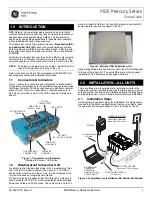
MEMORY/CALL PROGRAMMING
6
22
■
General
The transceiver has 100 memory channels (plus 5 pairs of
scan edge channels) and 1 call channel on each band for
storage of often-used frequencies.
Avionics band frequencies are stored in the VHF memory
channels (U.S.A. and Asia versions only).
D
Memory/call channel contents
The following information can be programmed into memory/
call channels:
• Operating frequency
• 8-digit memory name*
1
• Duplex direction (DUP or – DUP) with an offset frequency
(pgs. 19, 20)
• Subaudible tone encoder or tone squelch ON/OFF (pgs. 19,
32)
• Subaudible tone and tone squelch frequencies (pgs. 20, 32)
• Skip information*
2
(p. 30)
*
1
Except for call channels.
*
2
Except for the scan edge memory channels.
■
Programming during selection
q
Assign the main band to the desired display with [MAIN].
w
Select VFO mode with [VFO].
e
Set the desired frequency:
➥
Set the frequency using the keypad or [DIAL].
➥
Set other data (e.g. offset frequency, duplex direction,
subaudible tone frequency, etc.), if required.
r
Push [S.MW] momentarily to indicate memory channels.
• Do not hold [S.MW] for more than 0.5 sec., otherwise the mem-
ory channel will overwrite the displayed number.
t
Rotate [DIAL] to select the desired channel.
• Call channel (CAL) and scan edge channels (1A–5B), as well as
regular memory channels, can be programmed in this way.
y
Push [
(S.MW)
MW] for 2 sec. to program.
T SQL
DUP
MAIN
MAIN
momentarily
Set frequency and other data.
S.MW
[EXAMPLE]: Memory programming of ch 40 during selection.
















































